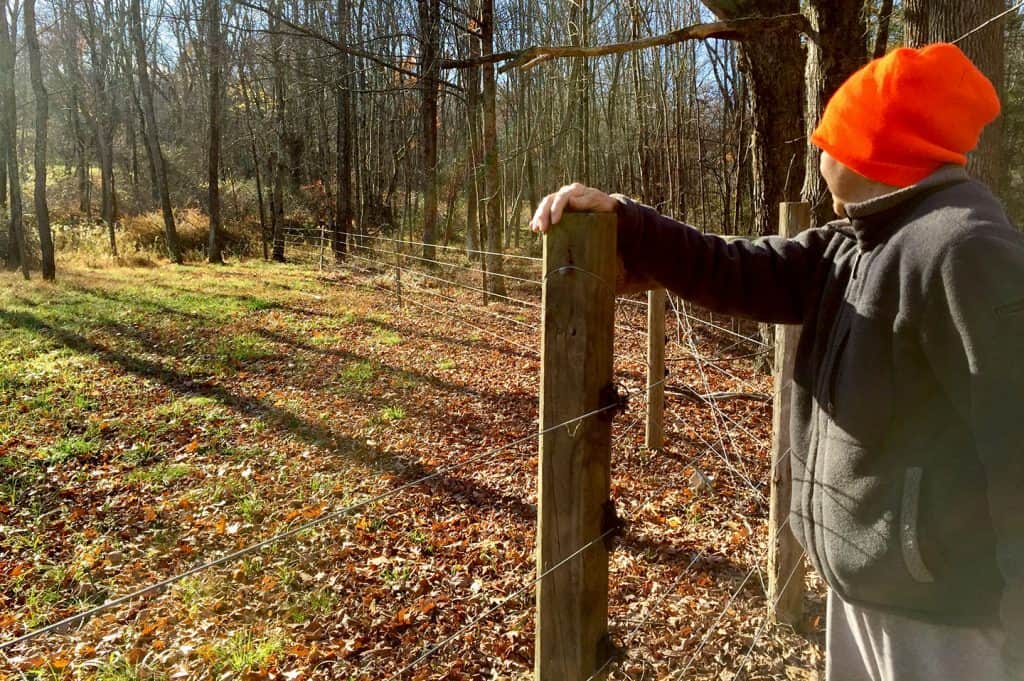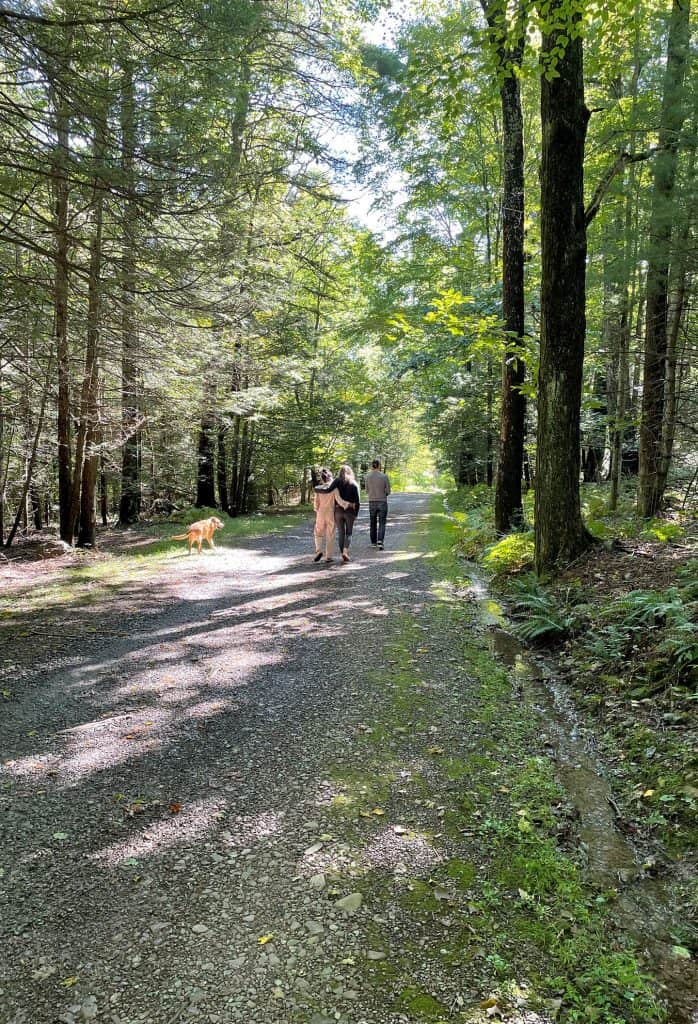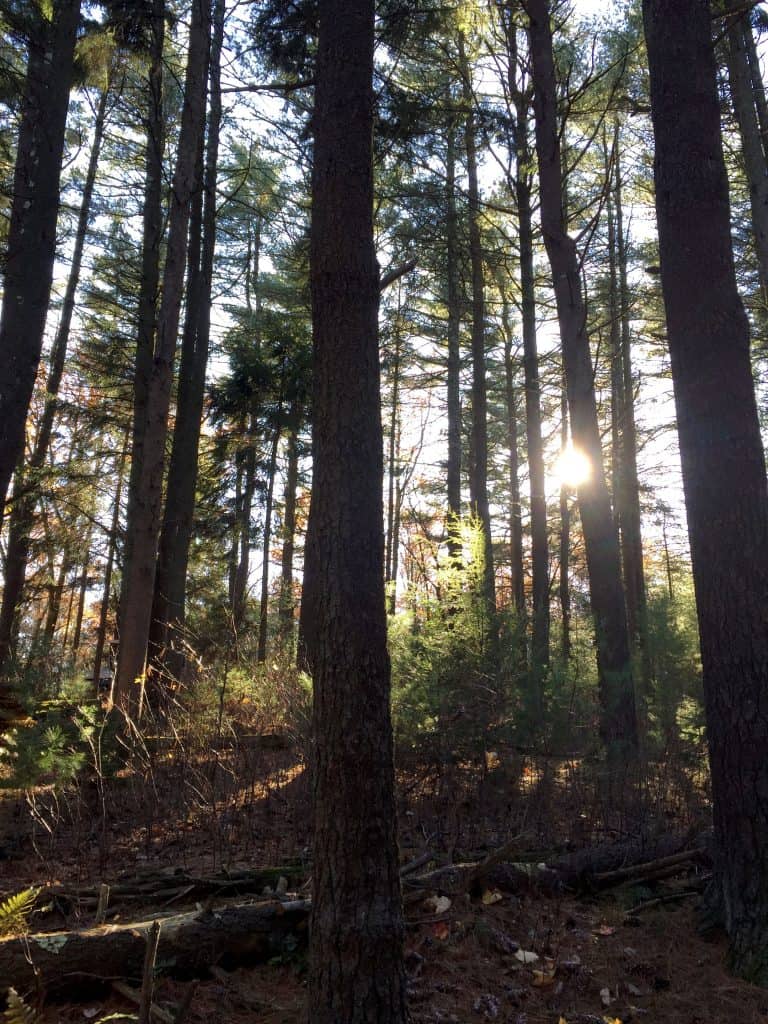
FAMILY FOREST CARBON PROGRAM

Of the 160 acres of the Timber Hill family farm, only a small part is pasture like this. Most is healthy woodland.
Focus on family forests for a sustainable future
By Carol Hillestad
Editor’s note: “Woods & Water” is an occasional feature focusing on the relation between land and water quality – and the conservation easements that help preserve our environment in the Brodhead watershed.
Timber Hill Farm is a state of mind as much as a place.
Hidden up a long dirt road in Paradise Township, little seems to have changed here in the last 100 years. The tidy stone house, outbuildings, pastures and woodlots are typical of a self-sufficient family farm of a century ago.
In summer, a few cows, goats, and a horse or two graze the hillside or the pasture that slopes to Forest Hills Run. There are chickens, of course, and the owner’s son produces pure, delicious maple syrup for family and friends.
Verdant, pastoral, peaceful: You feel you’ve stepped back in time.
Some land is pasture. But most of the 160 acres is forest, and keeping the forest healthy has always been a priority for owners Edie Stevens and her son Carl. That’s why they recently enrolled their lands in the Family Forest Carbon Program (familyforestcarbon.org).
“This program provides income for smaller landowners who want to increase the value of their woods and improve the forest habitat. It also gives us professional help in keeping the forested land here healthy,” Stevens said.
Most woodlands of 30 to 2,400 acres in Pennsylvania qualify for the Family Forest Carbon Program, Stevens added. “You get expert advice from experienced foresters, a custom plan for managing your woods, and cash payments to help you reach your goals for your land,” she said. Even sustainable timbering can be part of the equation within the contract limits.
The Family Forest Carbon Program is run by the American Forest Foundation and The Nature Conservancy and was recently expanded to include all of Pennsylvania, West Virginia, and parts of Maryland.
Payments to landowners flow from selling verified carbon credits, through Verra’s Verified Carbon Standard. The buyers are companies that first reduce emissions, then work to neutralize those they cannot eliminate. This program allows smaller landowners to tap the billion-dollar market for carbon offsets — while improving the health of their family forest.
In effect, these companies are paying landowners to keep their forests intact and healthy. Healthy forests “offset” carbon that is released into our air by burning fossil fuels for heat, manufacturing, transportation, and other uses.
That’s because forests are nature’s own way of capturing carbon: Trees guzzle carbon dioxide from the air and store the carbon in wood and soil. The U.S. Forest Service estimates that privately owned forestland stores about 90 tons of carbon per acre, and every year absorbs about 2.5 tons of CO2 per acre.
In the process, forests also produce oxygen, keep drinking water pure, provide vital wildlife habitat, and help prevent erosion and flooding. If that’s not enough benefit to humans, just looking at trees reduces stress, lowers blood pressure and improves mood.
The Family Forest Carbon Program is a win for people who own forested land they love, for companies committed to reducing their carbon footprint, and for doing something meaningful about climate change. All that — plus habitat for native creatures like woodcocks, black bear, bobcats, and trout and naturally clean air and water for all.
Not just relics of a bygone era, small family forests can continue to support life in harmony with the natural world. Like Timber Hill Farm, they can be much more than a state of mind. They can be a vital part of the solution to a very modern problem — and hope for the future.
For information, see familyforestcarbon.org; ecosystems.psu.edu (search “FFCP”); and verra.org.
Carol Hillestad is a hike leader and writer for Get Outdoors Poconos. The series is administered by Brodhead Watershed Association and supported by a grant from the William Penn Foundation.

Healthy forest protects air quality; pure, abundant water; and habitat for native creatures while defending against climate change. A walk in the woods is also a way to make memories. (Edie Stevens photo)

Like other creatures, humans are part of the natural world and benefit from spending time in nature.
